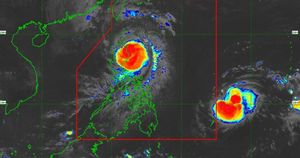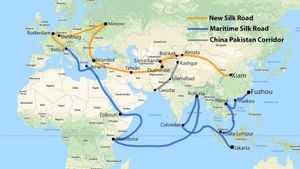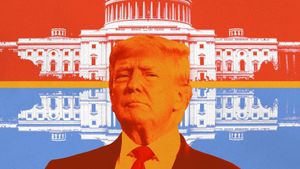French farmers launched protests across the country on November 14, 2024, expressing their vehement opposition to the European Union's proposed free trade agreement with the Mercosur bloc, which includes Brazil, Argentina, Paraguay, and Uruguay. These farmers contend the deal jeopardizes their livelihoods by significantly increasing agricultural imports from South America.
The concerns date back to 2019 when the EU and Mercosur reached an initial agreement, yet negotiations faced persistent hurdles due to fierce resistance from farmers and various European governments. Protests intensified as many farmers remained apprehensive about the agricultural practices prevalent in South America, particularly the use of pesticides.
On the same day as the Aurillac protests, more than 600 French lawmakers directed missives to EU Commission President Ursula von der Leyen, emphasizing their belief the deal's conditions have yet to be met. The French Agricultural Minister, Annie Genevard, echoed similar sentiments, declaring on national television, "We don’t want this agreement because it’s harmful... It will bring products including substances banned in Europe at the cost of deforestation and create unfair competition against our domestic production."
Demonstrations are expected to extend beyond France, with farmers from Belgium also preparing to protest near the EU headquarters. The FNSEA, which stands as France's largest farmers' union, headlined the protests, aiming to advocate for the agricultural sector as they gear up for future challenges potentially worsened by imported products.
The FNSEA's President, Arnaud Rousseau, indicated these protests would differ from previous years, clarifying, "We are not here to bother the French people; we want to make our voices heard without blocking roads or highways as we did last year." Instead, the plan encompasses rallies across multiple regions, aimed to coincide with the G20 summit happening soon where discussions about finalizing the trade agreement might take place.
The impending agreement could allow the EU to import up to 100,000 tons of beef from South American countries annually, raising alarms among farmers who fear this influx of cheaper imports may devastate France's domestic agriculture, already beleaguered by recent disasters. With low harvests due to adverse weather conditions and livestock diseases increasingly common, the stakes continue to rise.
Another union, Coordination Rurale, forecasts potential "agricultural revolts" following the winter sowing season. Their Vice President, Véronique Le Floc’h, shared thoughts on the farmers' frustrations about the EU's environmental regulations, stating, "The anger hasn't gone away. It’s still there, and, in fact, our worries have grown." She expressed her belief should the agreement come to fruition, it would signal the end of agriculture as they know it, pointing out the varying standards between the EU and Mercosur countries about food production practices.
French farmers are pressing for not just the government’s acknowledgment of their plight, but broader revisions to France’s agricultural policies, as many express dissatisfaction with delayed promises to address their issues.
While negotiations stretch back to June 1999, the current moment feels precarious as the European Union faces mixed reactions both domestically and among its member states. Discussions and modifications to the agricultural agreement will likely be pivotal, shaping the future of farming not only within France but across Europe.
Historically, these protests have deep roots, with farmers often rallying against perceived inequalities and unfair competition. The situation continues to evolve as they grapple with the long-term viability of the agricultural sector under pressure from imported goods bolstered by trade agreements suspected to undermine local farmers. With the G20 approaching, their collective effort may end up being the decisive factor influencing negotiations moving forward.



